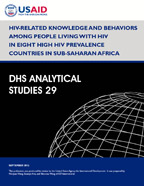- PUBLICATIONS
- JOURNAL ARTICLES
- ORDER PUBLICATIONS
Publications Summary
- Document Type
- Analytical Studies
- Publication Topic(s)
- HIV/AIDS
- Country(s)
- Kenya, Lesotho, Malawi, Eswatini, Tanzania, Uganda, Zambia, Zimbabwe
- Language
- English
- Recommended Citation
- Wang, Wenjuan, Soumya Alva, and Shanxiao Wang. 2012. HIV-Related Knowledge and Behaviors Among People Living with HIV in Eight High HIV Prevalence Countries in Sub-Saharan Africa. DHS Analytical Studies No. 29. Calverton, Maryland, USA: ICF International.
- Download Citation
- RIS format / Text format / Endnote format
- Publication Date
- September 2012
- Publication ID
- AS29
Download
 HIV-Related Knowledge and Behaviors among People Living with HIV in Eight High HIV Prevalence Countries in Sub-Saharan Africa (PDF, 291K)
HIV-Related Knowledge and Behaviors among People Living with HIV in Eight High HIV Prevalence Countries in Sub-Saharan Africa (PDF, 291K)
